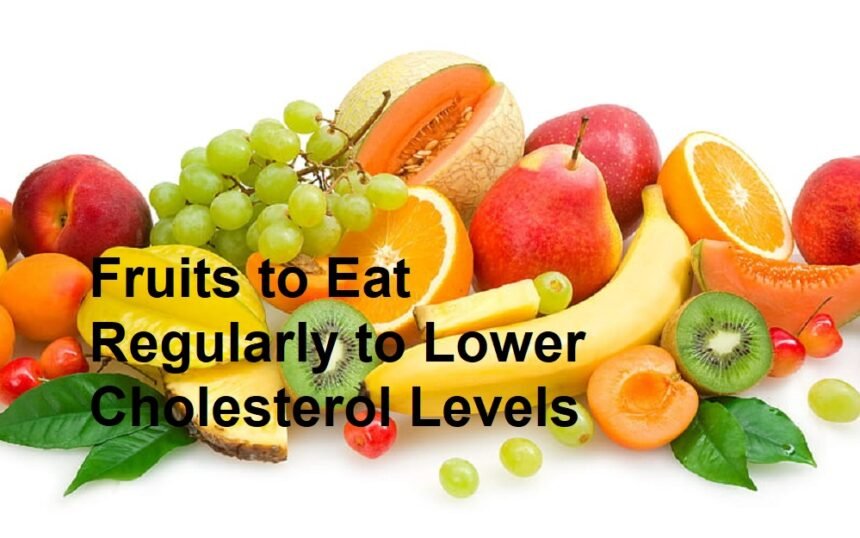Maintaining healthy cholesterol levels is essential for heart health. High levels of low-density lipoprotein (LDL), commonly known as “bad” cholesterol, can lead to heart disease, stroke, and other cardiovascular problems. Fortunately, certain fruits are packed with fiber, antioxidants, and healthy compounds that can help lower cholesterol naturally.
Here are some of the best fruits to include in your daily diet to effectively reduce cholesterol levels.
- Apples
“An apple a day keeps the doctor away” is more than just an old saying. Apples are an excellent source of soluble fiber, which helps reduce LDL cholesterol by preventing its absorption into the bloodstream.
Why are apples good for lowering cholesterol?
- Rich in pectin – a type of fiber that binds with cholesterol and eliminates it from the body.
- Contains polyphenols, which act as antioxidants to protect heart health.
- Helps improve gut health, which plays a role in cholesterol metabolism.
Best way to consume: Eat raw apples, add them to oatmeal, or make a fresh apple smoothie.
- Avocados
Avocados are a nutrient-dense fruit high in healthy monounsaturated fats, which help raise high-density lipoprotein (HDL), or “good” cholesterol, while lowering LDL cholesterol.
Why are avocados good for cholesterol?
- Contain beta-sitosterol, a plant compound that reduces cholesterol absorption.
- High in fiber, helping remove excess cholesterol from the body.
- Rich in heart-healthy fats, which support overall cardiovascular health.
Best way to consume: Add avocado to salads, sandwiches, or blend it into a smoothie.
- Berries (Strawberries, Blueberries, and Raspberries)
Berries are powerful superfoods loaded with antioxidants, fiber, and vitamins that contribute to lower cholesterol levels.
Why are berries effective?
- High in soluble fiber, which prevents cholesterol from being absorbed in the intestines.
- Rich in anthocyanins, which help improve blood vessel function and reduce inflammation.
- Help reduce oxidation of LDL cholesterol, which is a major risk factor for heart disease.
Best way to consume: Eat fresh berries, add them to yogurt, or blend them into smoothies.
- Citrus Fruits (Oranges, Grapefruit, and Lemons)
Citrus fruits are low in calories but high in soluble fiber and vitamin C, making them great for heart health.
How do citrus fruits lower cholesterol?
- Contain pectin, which binds to cholesterol and removes it from the body.
- Rich in flavonoids, which can lower LDL cholesterol and improve circulation.
- Help prevent artery plaque buildup, reducing heart disease risk.
Best way to consume: Drink fresh orange juice, eat grapefruit for breakfast, or add lemon juice to salads.
- Bananas
Bananas are a great source of potassium and fiber, both of which help maintain healthy cholesterol levels and lower blood pressure.
How do bananas help with cholesterol?
- Rich in soluble fiber, which reduces LDL cholesterol levels.
- Contain resistant starch, which promotes gut health and metabolism.
- Help regulate blood sugar and weight, reducing cholesterol risks.
Best way to consume: Eat bananas as a snack, add them to oatmeal, or blend them into a smoothie.
- Grapes
Grapes contain powerful antioxidants like resveratrol, which has been linked to lower LDL cholesterol and improved heart health.
Why are grapes good for cholesterol?
- High in flavonoids, which reduce inflammation and protect blood vessels.
- Contain fiber, which helps remove excess cholesterol.
- Help prevent LDL oxidation, reducing the risk of artery blockages.
Best way to consume: Eat fresh grapes, freeze them as a snack, or add them to fruit salads.
- Pomegranates
Pomegranates are one of the best fruits for heart health, thanks to their high levels of antioxidants and polyphenols.
How do pomegranates help lower cholesterol?
- Contain punicalagins, which help reduce LDL cholesterol.
- Improve blood circulation and prevent artery plaque buildup.
- Help lower blood pressure, further reducing heart disease risks.
Best way to consume: Drink fresh pomegranate juice or eat the seeds as a snack.
- Papaya
Papayas are rich in fiber, antioxidants, and vitamins, which all contribute to lower cholesterol and improved heart health.
Why is papaya beneficial?
- Contains fiber that removes cholesterol from the digestive system.
- High in vitamin C and antioxidants, which reduce LDL oxidation.
- Supports better digestion, preventing cholesterol buildup.
Best way to consume: Eat fresh papaya, blend it into a smoothie, or add it to fruit bowls.
- Watermelon
Watermelon is low in calories and high in water content, making it a heart-friendly fruit that helps lower cholesterol.
How does watermelon help?
- Contains lycopene, an antioxidant that reduces LDL cholesterol.
- Helps reduce blood pressure, lowering heart disease risks.
- Supports hydration, which is essential for cardiovascular health.
Best way to consume: Eat fresh watermelon slices or make a refreshing juice.
- Pears
Pears are one of the best sources of dietary fiber, making them highly effective in controlling cholesterol levels.
How do pears help lower cholesterol?
- High in pectin, which removes cholesterol from the bloodstream.
- Help improve digestion and prevent cholesterol buildup.
- Contain polyphenols, which promote heart health.
Best way to consume: Eat fresh pears or add them to salads and yogurt.
Eating cholesterol-lowering fruits regularly can significantly improve heart health and overall well-being. Fruits rich in fiber, antioxidants, and plant compounds—such as apples, avocados, berries, and citrus fruits—help reduce LDL cholesterol while promoting healthy circulation.
To maximize their benefits, incorporate these fruits into your daily diet alongside a balanced lifestyle, regular exercise, and healthy food choices. By doing so, you can maintain optimal cholesterol levels and reduce the risk of heart disease naturally.













